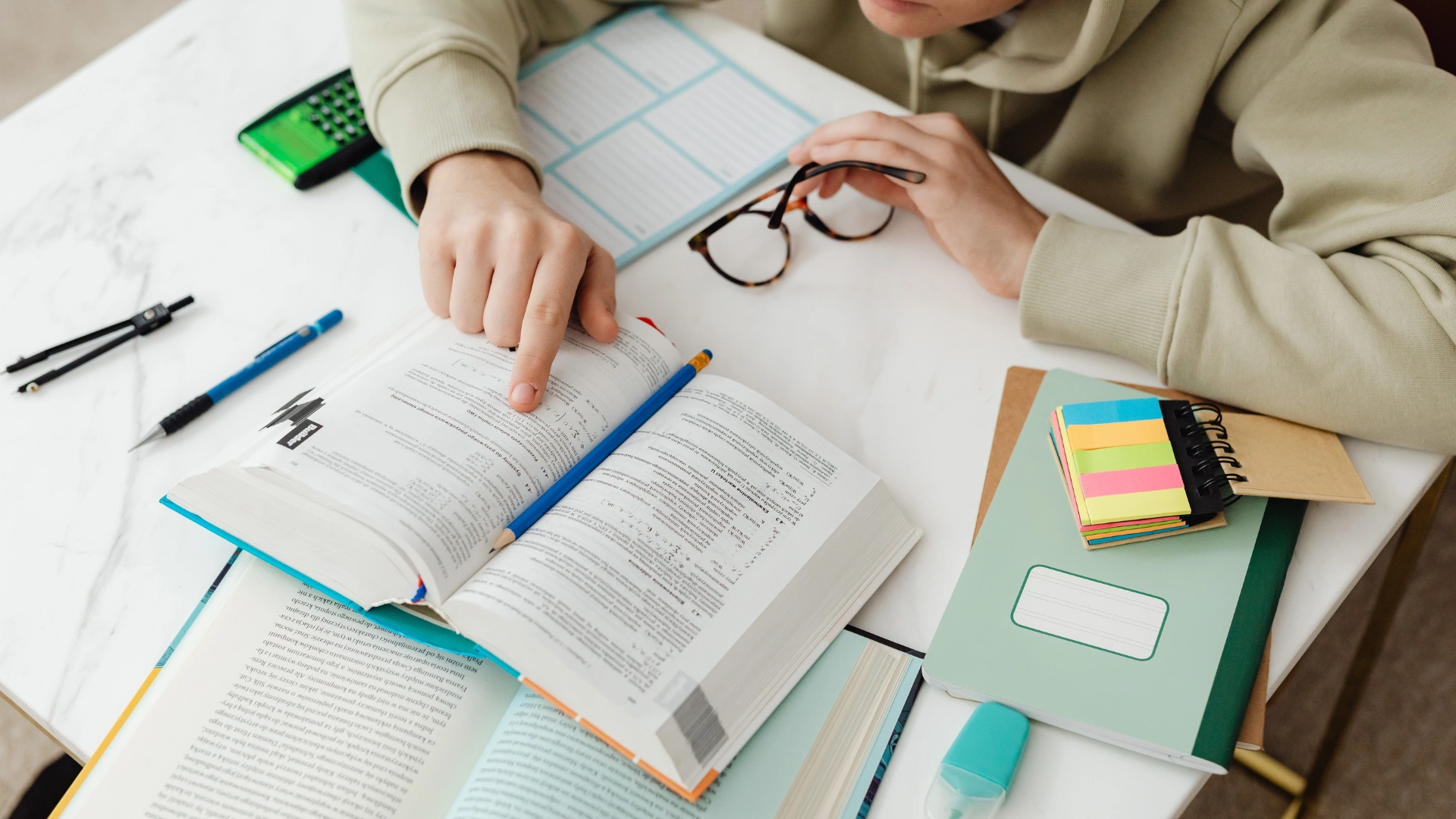- Home
Effective Study Habits

Overview
Studying smart is more effective than studying hard. Developing strong study habits can improve learning, retention, and academic success.
What Are Effective Study Habits?
Effective study habits help students focus, understand complex concepts, and recall information quickly. By using proven techniques, learners can enhance their comprehension, retain knowledge for longer periods, and improve overall academic performance. These strategies not only create better learning experiences but also foster discipline, time management, and critical thinking skills, leading to long-term success in education and beyond.
Creating a structured study schedule, minimizing distractions, and actively engaging with the material can significantly boost learning efficiency. Utilizing techniques such as summarization, self-quizzing, and group discussions enhances retention and understanding. Taking regular breaks and maintaining a healthy lifestyle also contribute to better concentration and cognitive function. Developing these habits consistently helps students build confidence and achieve their academic goals.
Book an Appointment
Take the first step toward academic success with expert guidance from our psychologists. Whether you need help with study habits, stress management, or academic challenges, we are here to support you..

What Are Effective Study Habits?
Effective study habits help students focus, understand concepts, and recall information quickly. These techniques create better learning experiences.
1. Create a Study
Plan
A well-structured study plan helps manage time efficiently. Break down subjects into smaller tasks. Set realistic goals and deadlines. Prioritize difficult subjects when energy levels are high. Use a planner or digital calendar to keep track of progress.
Book Now
2. Find a Distraction-Free Environment
Choose a quiet place to study. Turn off notifications. A clutter-free desk improves focus and productivity. Noise-canceling headphones can help eliminate background noise. Studying in the same location regularly improves concentration.
Book Now

3. Use Active Learning Techniques
Summarize notes, teach concepts to someone else, or use flashcards. Engaging with the material enhances understanding. Ask questions while reading, create mind maps, and visualize information to strengthen memory.
Book Now
4. Take Regular Breaks
Studying for long hours without rest reduces focus. Follow the Pomodoro Technique: study for 25 minutes, then take a 5-minute break. Longer study sessions should include a 15-minute break every 90 minutes. Short breaks refresh the brain and improve concentration.
Book Now
5. Practice
Self-Testing
Regularly quiz yourself on the material. Self-testing boosts memory retention and helps identify weak areas. Online quizzes, past exams, and practice tests reinforce learning. Write down questions and answers to enhance recall.
Book Now
6. Stay
Organized
Keep notes and materials in order. Use color-coded folders, sticky notes, and digital tools to effectively manage study resources efficiently and easily. Create an efficient filing system for quick and easy access to all important academic documents.
Book Now

7. Maintain a Healthy Lifestyle
Eat nutritious food, stay hydrated, and get enough sleep. A healthy mind performs better in learning and retention. Regular exercise improves focus and reduces stress. Avoid excessive caffeine and sugar, as they can lead to energy crashes.
Book Now
8. Use Different Study Methods
Mixing study techniques enhances comprehension. Try mind maps, charts, and mnemonic devices to remember complex information. Listening to recorded lectures or watching educational videos adds variety to learning.
Book Now
Stay Motivated
Set rewards for achieving study goals. Studying with friends or joining study groups can make learning enjoyable. Stay positive and remind yourself of long-term benefits. Find an accountability partner to keep progress on track.
Get Expert Guidance
If struggling with a subject, seek help from tutors or psychologists specializing in learning techniques. Professional guidance improves comprehension and reduces academic stress.
NPC Pakistan offers the best neuropsychology-based psychologists in Pakistan to guide students in overcoming academic stress and improving study habits effectively.
Take the First Step Toward Academic Success!
Let our expert psychologists guide you toward better study habits, reduced stress, and improved focus. Whether you need personalized support or group sessions, we’re here to help.
Effective study habits
Create a Study Schedule
Establish a structured timetable to stay organized and allocate sufficient time for each subject. Consistency helps reinforce learning and prevents last-minute stress.
Set Goals
Define clear, realistic objectives to stay motivated and measure progress. Whether it’s mastering a concept or completing assignments, goal-setting keeps you on track.
Note-Taking
Writing down important points improves comprehension and memory retention. Use bullet points, summaries, and diagrams to make reviewing easier.
Ask for Help
Don’t hesitate to seek assistance from teachers, mentors, or peers. Understanding difficult topics becomes easier with guidance and clarification.
Eliminate Distractions
Find a quiet study environment, turn off unnecessary notifications, and focus entirely on your work to boost productivity.
Take Breaks
Short, scheduled breaks between study sessions help refresh the mind, reduce fatigue, and enhance concentration. Try the Pomodoro technique for effective time management.
Study Every Day
Regular study sessions reinforce learning and reduce the need for last-minute cramming, making exam preparation much easier.
Study Together
Group study sessions encourage discussion, improve understanding, and offer new perspectives on challenging topics. Just ensure the group remains focused!
Time Management
Prioritize tasks wisely and set deadlines for yourself. Effective time management prevents procrastination and ensures all topics are covered.

Additional Tips for Effective Studying
-
Use technology wisely, such as educational apps, interactive websites, and online study tools to enhance learning and streamline studying.
-
Develop a consistent study routine by setting a fixed schedule, allocating dedicated time for each subject, and sticking to it diligently.
-
Reduce multitasking and focus on one task at a time to improve concentration, minimize distractions, and retain information more effectively.
-
Read aloud while studying to reinforce learning, boost comprehension, and enhance verbal memory, making it easier to recall information later.
-
Take detailed handwritten notes to improve memory retention, organize key concepts effectively, and strengthen understanding through active engagement.
Why Effective Study Habits Matter?
Good study habits improve concentration, reduce procrastination, and increase knowledge retention, making it easier to grasp and recall complex information. They help students excel in exams by enhancing their understanding of subjects, improving problem-solving skills, and boosting overall academic performance. Developing effective study strategies also builds confidence, encouraging students to approach learning with a positive mindset and motivation.
Efficient studying reduces stress by preventing last-minute cramming, allowing students to stay organized and prepared for assessments. It also creates a balanced approach to learning, ensuring that students have enough time for personal activities, hobbies, and relaxation. By maintaining a structured study routine, learners can achieve their academic goals while maintaining a healthy work-life balance.
Why Choose Us?
Npc Pakistan is a trusted name in psychology services. Our team of experienced psychologists specializes in helping students develop effective study habits, manage stress, and overcome academic challenges.
We provide personalized guidance to enhance learning strategies and improve academic performance. Our expert support helps students build confidence, stay motivated, and achieve their educational goals. With evidence-based techniques, we ensure a positive and productive learning experience for every student.
What We Offer:
- Personalized study improvement plans
- Stress and anxiety management techniques
- Cognitive training for better concentration
- Expert counseling for academic success. One-on-one and group sessions available
Our psychologists understand student struggles and provide practical solutions to enhance learning efficiency. With years of experience, we ensure that students receive the best guidance to improve their academic performance.
We use evidence-based strategies to help students stay focused, motivated, and confident in their abilities. Our tailored approach ensures that each student’s unique learning needs are met effectively. By fostering positive study habits and mental resilience, we empower students to excel academically and achieve their full potential.
Struggling with focus, stress, or study habits?
Our expert psychologists are here to help you succeed! Get personalized guidance, proven techniques, and the support you need to excel in your studies, Contact us today!
Testimonial
What They Say
My son was struggling with focus and time management. Thanks to Npc Pakistan’s counseling sessions, he has developed a strong study routine and is performing much better in school

Sarah K. Parent
Npc Pakistan helped me overcome my academic stress. Their expert guidance improved my concentration, and now I feel more confident in my studies. Highly recommended!

Ali R. Student
I was always anxious about exams. The psychologists at Npc Pakistan provided me with stress management techniques that truly made a difference. Now, I study with a clear mind and better focus

Hamza M. University Student
FAQ
Frequently Ask Questions
1. How Can I Focus 100% on Studying?
To fully concentrate on studying, eliminate distractions, choose a quiet study environment, and set specific goals for each session. Use techniques like the Pomodoro method (study for 25-50 minutes, then take a short break) to maintain focus. Stay organized, keep your phone away, and avoid multitasking. Practicing mindfulness, staying hydrated, and getting enough sleep also enhance concentration.
2. What Are the Top 5 Tips for Effective Studying?
- Create a Study Plan – Organize your subjects and allocate time efficiently.
- Use Active Learning Techniques – Engage with the material through summarization, self-quizzing, and discussions.
- Take Regular Breaks – Prevent burnout and improve retention with short rest periods.
- Eliminate Distractions – Study in a quiet, clutter-free space and turn off unnecessary notifications.
- Practice Consistency – Develop a daily study routine to reinforce learning and build discipline.
3. What Are Effective Study Habits 7?
- Set clear and realistic study goals.
- Maintain a consistent study schedule.
- Take detailed notes to aid retention.
- Use active recall and self-testing.
- Stay organized with study materials.
- Take care of your mental and physical health.
- Review and revise regularly to strengthen understanding.
4. What Are the Top 10 Good Habits for Students?
- Time Management – Prioritize tasks efficiently.
- Consistent Study Routine – Study regularly, not just before exams.
- Active Listening – Pay attention in class and take notes.
- Asking Questions – Clarify doubts early.
- Reading Habit – Expand knowledge beyond textbooks.
- Healthy Lifestyle – Eat well, exercise, and get enough sleep.
- Avoiding Procrastination – Start assignments on time.
- Staying Organized – Keep notes and materials in order.
- Group Studying – Collaborate and discuss with peers.
- Staying Motivated – Set goals and celebrate small achievements.
Success in studying comes from discipline, consistency, and smart strategies. Follow a structured study plan, actively engage with learning materials, take effective notes, and test yourself regularly. Stay motivated, manage time wisely, and maintain a healthy balance between study and relaxation.
6. What Are the 10 Qualities of a Good Student?
- Self-Discipline – Maintains focus and avoids distractions.
- Curiosity – Always eager to learn and ask questions.
- Hard Work – Puts in consistent effort and dedication.
- Time Management – Plans and prioritizes effectively.
- Responsibility – Completes assignments and meets deadlines.
- Good Communication – Expresses ideas clearly.
- Critical Thinking – Analyzes and solves problems effectively.
- Positive Attitude – Stays motivated and determined.
- Resilience – Overcomes challenges and learns from failures.
- Collaboration – Works well with others and values teamwork.


